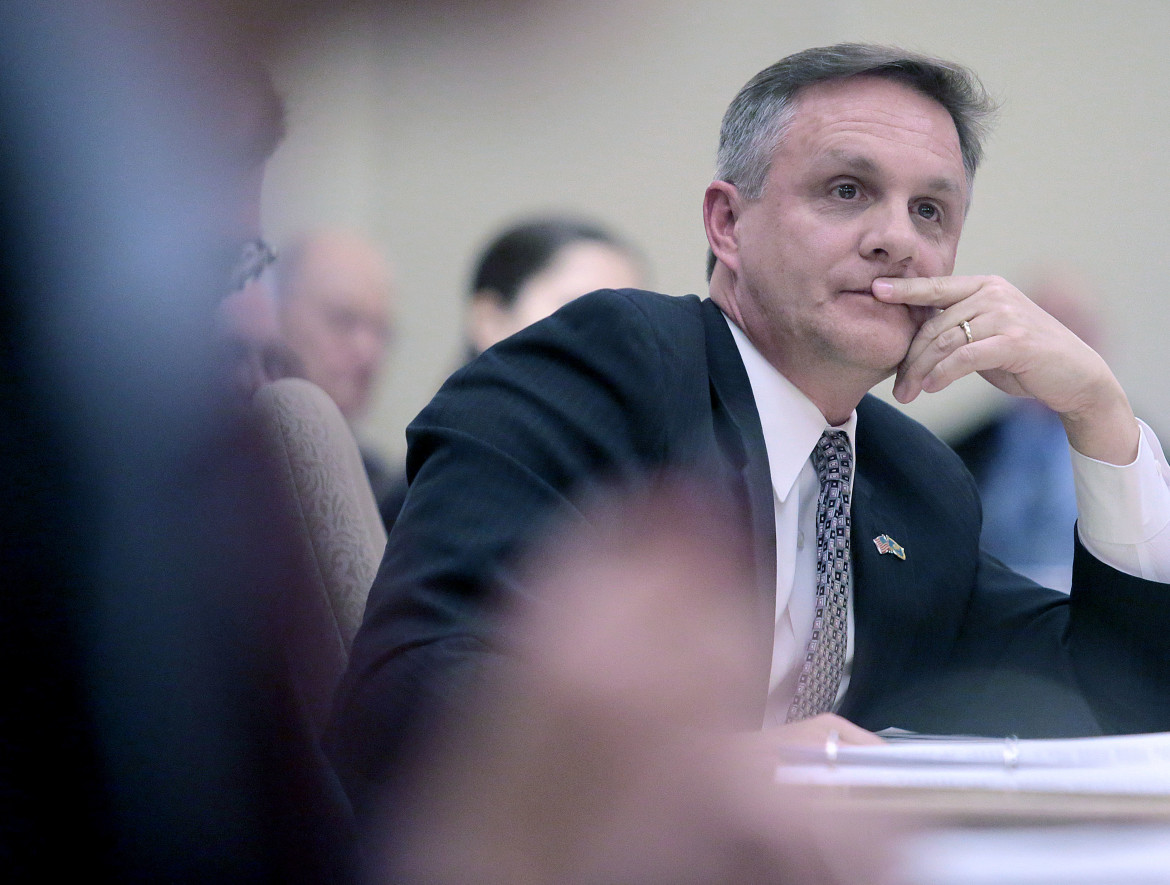Walker Aides Ordered To Avoid State Phones, Email?
Two cabinet members say Huebsch instructed them to use private channels for state business.

Two former cabinet members under Gov. Scott Walker say they were instructed by former Administration Secretary Mike Huebsch not to conduct important state business by state email or on state telephones. Huebsch said he merely warned fellow cabinet members to be careful because such communications could be made public. Photo by John Hart of the Wisconsin State Journal.
Two former members of Gov. Scott Walker’s cabinet say the administration has had a policy of communicating official business through private channels.
The allegations come as the Walker administration faces criticism for cutting public access to internal text messages and other so-called transitory state records.
Peter Bildsten, former secretary of the Department of Financial Institutions, and Paul Jadin, former head of the Wisconsin Economic Development Corp., said they were instructed in Walker’s first term by then-Administration Secretary Mike Huebsch not to use official email or state telephones to relay important information or documents.
Bildsten said Huebsch, Walker’s top aide, gave this warning at a cabinet meeting: “Don’t send me an email of anything important on my state computer, and don’t call me on anything of importance on my state phone. If you have anything of consequence or importance, call me on your personal phones or walk it over.”
“And that,” Bildsten said, “is how most communications were handled going forward.”
Bildsten said Walker was at most cabinet meetings early in his first term, but he does not remember if the governor attended that specific session, which he believes occurred in the first half of 2011.

Paul Jadin, former chief executive officer of the Wisconsin Economic Development Corp., says he recalls then-Administration Secretary Mike Huebsch “bragged” that he never used email. Gov. Scott Walker’s administration is under fire for withholding records deemed “transitory,” some involving visitors to the Executive Residence and others involving a failed $500,000 taxpayer-funded loan from WEDC to a major Walker campaign donor. Photo by John Hart of the Wisconsin State Journal.
Jadin, the first chief executive of WEDC, had a similar recollection of Huebsch’s stance. Jadin said he remembers Huebsch “bragged” about not using email and “making a big deal about what emails were discoverable.”
In recent months, the Walker administration has told requesters that records sought under the public records law no longer exist — deeming them transitory, or of limited usefulness. The records in dispute include logs of visitors to Walker’s Executive Residence and correspondence about a failed $500,000 loan from WEDC to a Walker donor that has sparked calls for a criminal investigation.
Huebsch, who now serves on the Public Service Commission, denied he told cabinet members “to avoid making public records” and said the allegation that he told them not to use state telephones is “ludicrous.” He acknowledged that he repeatedly addressed cabinet members regarding email to ensure that top officials understood their communications could be made public.
“I did not direct them to never use email, I told them to be prepared that anything they write, or more accurately an edited version of their email that fits a pre-written story, could show up on the front page of the newspaper, so review emails carefully before sending,” Huebsch said in an email to the Wisconsin Center for Investigative Journalism.
“Email is often spur of the moment, sometimes emotion driven communication,” he added. “It can include irony, sarcasm or thoughts intended as jokes that, when taken literally or out of the full context of the conversation can appear to mean something very different, even completely opposite of what was intended.
“In this era of ‘gotcha’ politics, where opponents and some journalists use anything available not just to embarrass but destroy, extra caution is essential.”
Walker spokeswoman Jocelyn Webster also denied there was a policy of communicating privately about state business.
“We frequently remind members of the administration that they should not email or text anything that they do not want to see on the front page of the (Milwaukee) Journal Sentinel,” Webster wrote in an email.
“This statement highlights that our office complies with the open records law. The governor’s office retains email and text messages conducting state business, including those sent to/from personal emails or cell phones, and produces them in response to open records requests.”
(I)t is declared to be the public policy of this state that all persons are entitled to the greatest possible information regarding the affairs of government and the official acts of those officers and employees who represent them.
“To that end, (the public records law) shall be construed in every instance with a presumption of complete public access, consistent with the conduct of governmental business. The denial of public access generally is contrary to the public interest, and only in an exceptional case may access be denied.”
— Chapter 19, Wisconsin public records law
Informed of Huebsch’s response, Jadin said he does not recall a specific directive but added, “I was left with the impression that he (Huebsch) did not want to be contacted using state technology.”
Bildsten said he stands by his recollection of Huebsch’s order. He said the secretary operated as the “junior governor” to Walker, and his admonition to conduct important state business away from state email and phones was “loud and clear.”
Bildsten said he recalled Huebsch telling the group, “I don’t want to see anything of consequence on a state email.”
“We only had to hear that once,” Bildsten said. “Anything else was at your own peril.”
Probe included records law
This is not the first time that a Walker administration has been accused of conducting the public’s business in private.
The so-called John Doe I investigation — which netted convictions against six aides, associates and appointees of Walker when he was Milwaukee County executive — uncovered a secret Internet wireless router in Walker’s office suite. The probe also unearthed tens of thousands of pages of private emails and other electronic messages in which Walker and his aides routinely mixed county business with campaign work.

Former Wisconsin Department of Financial Institutions Secretary Peter Bildsten says he was told by Administration Secretary Mike Huebsch not to send anything of “consequence” through official channels. Bildsten resigned this spring under pressure after he said he declined to promote Walker’s plan to consolidate DFI with another state agency. Walker later dropped the plan. Photo courtesy of Peter Bildsten.
Court records filed in July also showed Cindy Archer — who held the comparable role in Milwaukee County government to Huebsch’s job in the Walker administration — was under criminal investigation in 2010 and 2011 for allegedly violating the state’s public records law by routinely using private email to conduct county business and coordinating which county records to release to the public with members of Walker’s 2010 gubernatorial campaign. No charges were ever filed.
This summer, the Wisconsin State Journal filed a public records request for text messages sent and received between Huebsch and his deputy, Chris Schoenherr, over a $500,000 unsecured state loan in 2011 to a top Walker campaign contributor’s company that went belly up.
The State Journal revealed Huebsch had pushed for the WEDC loan to Building Committee Inc., which was owned by Walker donor William Minahan. The $500,000 loan to the collapsing Milwaukee construction firm created no jobs and was never repaid. The state has sued to recover the money.
In response to the State Journal’s request for Schoenherr’s text messages, the agency told the newspaper there were no such messages — although records about BCI released in June indicated there had been such communication.
DOA spokesman Cullen Werwie cited the definition of “transitory records,” which the state Public Records Board had altered on Aug. 24 — two days before the agency notified the State Journal there were no such messages. Werwie did not answer questions about when the text or texts were deleted and whether that deletion followed the administration’s policies.
The public records law prohibits officials from destroying a record for 60 days after a requester has been denied access or until litigation is completed.
Christa Westerberg, an attorney for the Wisconsin Center for Investigative Journalism, said the administration appears to be “over-zealously interpreting the term ‘transitory record.’ ”
“To allow government employees to make on-the-spot decisions to destroy what they view as ‘transitory’ records isn’t what the law appears to envision, and invites excessive destruction,” Westerberg said. “In my opinion, the state shouldn’t be allowing destruction of text messages or other records based on the new definition of ‘transitory’ at this time.”
On Monday, the nonprofit Wisconsin Freedom of Information Council filed a complaint with Dane County District Attorney Ismael Ozanne alleging the Public Records Board violated the open meetings law by failing to notify the public about its intended actions. (Full disclosure: Westerberg and two Center leaders — executive director Andy Hall and managing editor Dee J. Hall — serve as members of the council.)
In response to the complaint, Public Records Board chairman Matthew Blessing on Thursday said the board would “revisit” the earlier action and “place those items on a detailed agenda for an upcoming meeting.”
He said the board had thought the changes were “relatively routine and uncontroversial,” however, “public concern over the management of transitory records has led the board to reevaluate the matter.”
Blessing, state archivist at the State Historical Society, added that the content — not the format — of a record determines whether it should be retained. He said the board recommends that government officials not use text messages due to their “unstable nature.”
Attempt to evade public scrutiny?
Wisconsin FOIC president Bill Lueders said allowing state officials to destroy records about government dealings is contrary to the spirit of the public records law.
“If I send a letter to the street superintendent of Neenah complaining about the sidewalk in front of my house, he has to keep it for seven years,” said Lueders, a former Center reporter. “If a state official text messages about somebody who’s in the process of making away with half a million dollars of the public’s money, they can destroy that at will?”
And the reported policy of shunning official government email and phones to do state business raises many questions, he said.
“It’s an obvious effort to evade detection, and to me it’s indicative that the people involved feel as though they have some reason to hide, or something to hide,” Lueders said. “Really, why go through such exertions to avoid creating records if what you’re doing is on the up-and-up?”
Bildsten, a former bank executive, served just over four years under Walker. He said he resigned under pressure, effective in April, after refusing to promote Walker’s plan to merge his agency, the Department of Financial Institutions, with the state Department of Safety and Professional Services, as part of the governor’s budget. Walker later dropped that plan.
Jadin, who left less than halfway through Walker’s first term, said he largely ignored the admonitions about avoiding state phones and email. He characterized Huebsch’s approach as too inefficient.
University of Wisconsin-Madison journalism professor Robert Drechsel, a member of the state Freedom of Information Council, said such a policy appears to be aimed at shielding state government from public scrutiny.
“Over the years a remarkable range of strategies have been used to try to circumvent open records laws,” said Drechsel, who teaches media law and also heads the UW-Madison Center for Journalism Ethics. “One is for government officials to communicate without creating any physical record of what they say and do. Technically, this might be legal.
“But if the goal is to avoid creating a record that would document and provide insight into decision-making and avoid the inconvenience or embarrassment of public scrutiny, I’d say it’s ethically wrong. It is not government in the public interest.”
Wisconsin State Journal reporter Matthew DeFour contributed to this report. The nonprofit Wisconsin Center for Investigative Journalism (www.WisconsinWatch.org) collaborates with Wisconsin Public Radio, Wisconsin Public Television, other news media and the UW-Madison School of Journalism and Mass Communication. All works created, published, posted or disseminated by the Center do not necessarily reflect the views or opinions of UW-Madison or any of its affiliates.
-
Legislators Agree on Postpartum Medicaid Expansion
 Jan 22nd, 2025 by Hallie Claflin
Jan 22nd, 2025 by Hallie Claflin
-
Inferior Care Feared As Counties Privatize Nursing Homes
 Dec 15th, 2024 by Addie Costello
Dec 15th, 2024 by Addie Costello
-
Wisconsin Lacks Clear System for Tracking Police Caught Lying
 May 9th, 2024 by Jacob Resneck
May 9th, 2024 by Jacob Resneck






















Still one of my favorite articles from the early years! http://www.jsonline.com/news/milwaukee/113099989.html
Welcome to Wisconsin. Where stupid teabaggers vote in and mindlessly support criminals and bottom feeding dirt bags to positions of power so they can save $100 on their taxes. This state is pathetic.
It sounds like Walker and his cronies have been trying to make sure that state government operates like one big back room.
Just as underworld operatives collect and hand out envelopes of cash and give verbal directives in back rooms of restaurants or off the beaten track, Walker officials are hand delivering hard-copy docs and using alternate communications. It must make everyone feel somewhat sleazy, even when they’re just doing the daily business of their jobs and not actually being criminal, like some of his staff.
Walker is destroying the credibility of the civil service, beyond what he and corrupt henchmen are doing that are the really dirty dealings behind the scenes.
Walker is the sleaziest politician we’ve seen in decades. He hasn’t been caught yet but he’s a criminal just the same. At some point his uncontrollable desire for power will get the best of him. He will be nailed just like Richard Nixon. Two sleaze bags who think alike. Also like Nixon he will be back to run for president again.